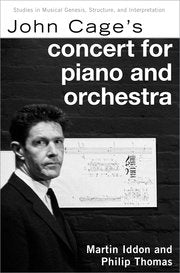
OXFORD UNIVERSITY PRESS - 19
John Cage's Concert for Piano and Orchestra
Composer: John Cage
Quantity:
Pickup available at Juilliard Store
Usually ready in 4 hours
John Cage's Concert for Piano and Orchestra
Juilliard Store
Pickup available, usually ready in 4 hours
144 West 66th Street
New York NY 10023
United States
Choose options
Quantity:
Pickup available at Juilliard Store
Usually ready in 4 hours
John Cage's Concert for Piano and Orchestra
Juilliard Store
Pickup available, usually ready in 4 hours
144 West 66th Street
New York NY 10023
United States
Quantity:
Pickup available at Juilliard Store
Usually ready in 4 hours
John Cage's Concert for Piano and Orchestra
Juilliard Store
Pickup available, usually ready in 4 hours
144 West 66th Street
New York NY 10023
United States
Martin Iddon and Philip Thomas
Studies in Musical Genesis, Structure, and Interpretation
- Examines one of Cage's most significant pieces within a wide range of contexts
- Develops new models for the analysis of Cage's music
- Demystifies an apparently complex and bewildering score
- John Cage's Concert for Piano and Orchestra is one of the seminal works of the second half of the twentieth century, and the centerpiece of the middle period of Cage's output. It is a culmination of Cage's work up to that point, incorporating notation techniques he had spent the past decade developing - techniques which remain radical to this day. But despite Cage's vitality to the musical development of the twentieth century, and the Concert's centrality to his career, the work is still rarely performed and even more rarely examined in detail.
In this volume, Martin Iddon and Philip Thomas provide a rich and critical examination of this enormously significant piece, tracing its many contexts and influences - particularly Schoenberg, jazz, and Cage's own compositional practice - through a wide and previously untapped range of archival sources. Iddon and Thomas explain the Concert through a reading of its many histories, especially in performance - from the legendary performer disobedience and audience disorder of its 1958 New York premiere to a no less disastrous European premiere later the same year. They also highlight the importance of the piano soloist who premiered the piece, David Tudor, and its use alongside choreographer Merce Cunningham's Antic Meet. A careful examination of an apparently bewildering piece, the book explores the critical response to the Concert's performances, re-interrogates the mythology surrounding it, and finally turns to the music itself, in all its component parts, to see what it truly asks of performers and listeners.
